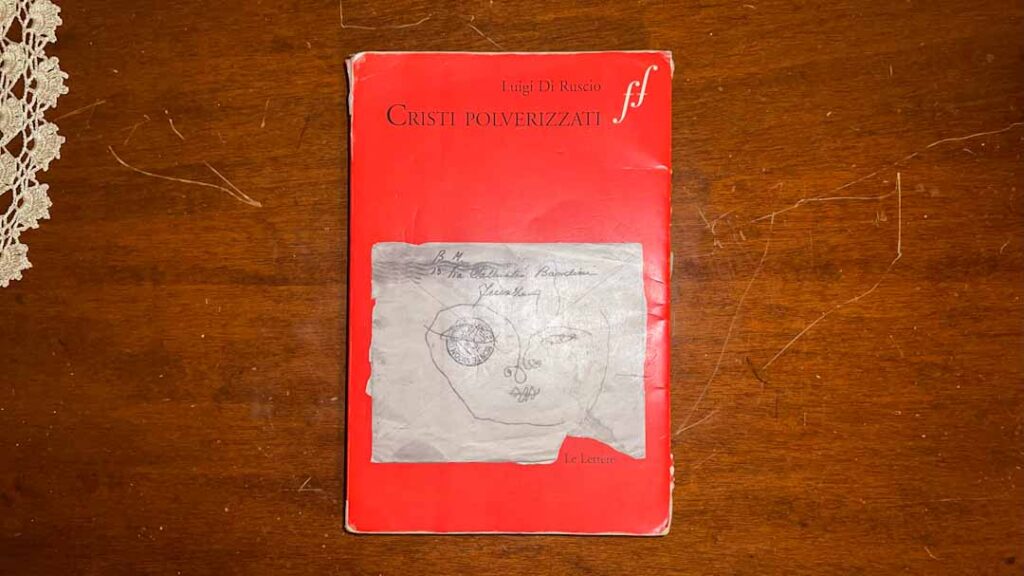
Luigi Di Ruscio, born in Fermo in 1930, remains one of the most underrated voices of Italian literature. His life and work reflect a rare determination and unique linguistic inventiveness. He maintained a deep connection to his roots in Le Marche, even as he spent decades abroad. He never made it into the mainstream, but he was celebrated by the most influential critics. His character offers a unique window into both the human condition and the Fermo of the mid-20th century.
Early Life: From Rural Hardship to Literary Passion
Growing up in pre-WW2 rural Italy, and living his adolescence through the times of war, Di Ruscio faced significant hardships.
He came from a very humble family. Formal schooling was limited for the poor, and he was only able to complete elementary school. Yet, since a young age he was attracted by books and writing.
He taught himself literature and poetry, immersing himself in Italian classics (Dante Alighieri, Giacomo Leopardi, Benedetto Croce). He studied Greek mythology, American and French authors, and even Norse myth sagas. This self-directed study laid the foundation for his distinctive voice.
per un inverno intero una vespa
fu il nostro unico animale domestico
per nutrirla bastò
una goccia di acqua e zucchero alla settimana
con la primavera sparì per sempre
per abbeverarsi in uno zuccherificio infinito
ed oggi per passare dalla zona d’ombra
alla luce è bastato un passo solo
for a whole winter a wasp
was our only pet
to feed it, all it took
was a drop of water and sugar each week
with spring it vanished forever
to keep drinking in an endless sugar factory
and today, to pass from shadow
into light, it took a single step
Life’s Challenges and the Writing Obsession
At age 23, Di Ruscio published his first poetry collection book, Non possiamo abituarci a morire (We can’t get used to dying, Schwarz, Milan, 1953).
The same year he won the Premio Unità, a prestigious award, with Nobel Prize winner Salvatore Quasimodo being the head of the jury.
During that time, he connected with the Italian literary scene, and met established writers and poets like Franco Fortini, who wrote the preface to his first book.
Fortini said: “These poetries of misery and hunger, disheartenment and revolt, are born from direct experience and they are its transcription”.
Despite coming from a background removed from the cultural centers of Italy, Di Ruscio’s persistence showed his determination to pursue literature.
Life Abroad: Oslo and the Evolution of Language
In 1957, Di Ruscio relocated to Oslo, Norway. He got a job in a factory as a steelworker that he kept until retirement. He got married to a Norwegian woman, had four children and raised a family there.
sognavo di essere in un ascensore
che precipitava continuamente
alla fine mi scaraventa
nel reparto dove ho lavorato
ecco l’inferno spalancato
che ho attraversato tutti i giorni
per quaranta anni rimanendo incolume
nonostante avessero programmato
la mia morte per la vita loroLUIGI DI RUSCIO, L’IDDIO RIDENTE, ZONA 2008. Read more on Poetarum Silva.
I dreamed I was in an elevator
that kept falling endlessly
in the end it threw me
into the factory floor where I worked
there it is, the hell wide open
that I crossed every day
for forty years coming out
safe,
even though they had planned
my death to sustain their lives
His time abroad was formative. He continued writing maniacally, developing a unique vocabulary that constantly evolved, a mix of Italian, his native dialect, and neologisms. This linguistic inventiveness made his works unlike anything else in Italy at the time.
“Cristi Polverizzati”: A Window into Human Frailty

One of Di Ruscio’s most remarkable works is Cristi Polverizzati, a novel that captivated me for its unusual vocabulary and intricate style. The book is both a meditation on human vulnerability and the portrait of a Fermo that had changed during his absence. Through his writing, he tells the stories of a bygone era, and captures the tension between childhood memories and his own visionary mind.
For further commentary on his style and themes, see Le parole e le cose and Nazione Indiana.
Parto difficilissimo, spesso si nasce venendo stritolati, lo shock dell’aria freddissima rispetto al calore del ventre materno, la luce vivissima, i rumori assordanti, la poesia retrocede verso la prima angoscia […]
A really hard birth,
you often come into the world being crushed,
the shock of freezing air after the warmth of the womb,
the blinding light, the deafening noises, poetry pulls back toward that first anguish…
Return to Italy: A Changed Fermo
Upon returning to his homeland, Di Ruscio noticed that the city and its people had changed.
The Fermo he knew as a child had evolved. People spoke differently, acted differently, and he couldn’t recognise the place he had kept alive in his writing.
His latest work is La neve nera di Oslo (Oslo’s Black Snow, Ediesse), a novel about an Italian immigrant in Scandinavia. The book was published in 2010. Di Ruscio died in Oslo in 2011.
Legacy: Passion, Determination, and Literary Innovation
Luigi Di Ruscio never received widespread recognition, however Italian critics and the literary community were very attentive to his work and treated him with the upmost praise. His story is a testament to resilience and obsession towards creativity.
His works remain a valuable resource for understanding Italian poetry beyond the mainstream. It offers insights into personal struggle, cultural identity, and the power of language.
